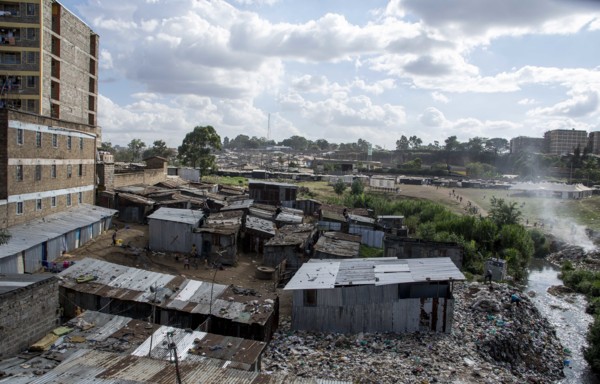Corona crises hit hard on the most vulnerable
Date
March 20, 2020
Slum area outside Nairobi, Kenya, Photo Alfred Skogberg
– We work with those living on the margin and now see that they are hit hard by the Corona crisis. They have no Government safety nets to lean on, can’t work from home and live in environments where the virus can spread quickly, says Anna Tibblin, Vi Agroforestry’s Secretary General.
Vi Agroforestry collaborates with around 40 partner organisations in four countries in East Africa; Kenya, Uganda, Rwanda and Tanzania. The Corona crisis has very suddenly posed major challenges for both the organisation’s own operations and for the partner organisations. The shrinking democratic space is becoming even more noticeable.
– In Nairobi, the number of people moving in the streets decreased from one day to the next. But still, many people must use public transport to get to and from their jobs. Police check that minibuses have hand disinfection for all passengers. Prohibition on public gatherings can also be used for political purposes, for example in countries such as Uganda, where an election campaign is coming up and freedom of assembly has already been restricted, says Vi Agroforestry’s regional director, Lena Martens Kalmelid.
The first case in Kenya was reported on March 13th. March 30, Kenya has 38 reported coronary cases. In Rwanda there is 70 cases, in Tanzania 14 cases and in Uganda 30. There is great concern that the situation can change quickly and worsen.
The authorities in the region have introduced various decrees to limit possible spread of the virus. They have restricted entry to the country, closed schools, prohibited church gatherings and markets, and urge people not to use public transport other than in case of emergency.
– Women in rural areas who earn their living by selling their agricultural products in the local markets, already see income opportunities decreasing. There is also a concern about increased violence against women in the homes, when resources quickly become scarce, says Lena Martens Kalmelid.
In many countries where Vi Agroforestry operates, the authorities, just like in Sweden, encourage residents to work from home as much as possible. But not even in countries such as Kenya, where the IT infrastructure is relatively developed and stable, this is an opportunity for many. Vi Agroforestry has been working to find a solution so that all employees will be able to stay connected from home in order to continue working, and all offices are now being closed.
– The rain has just begun, and with that the growing season. The more mobility is limited, the more difficult it becomes to distribute seeds and tree plants, and the farmers cannot gather for joint activities and trainings. There is a great risk of lack of food going forward, says Lena Martens Kalmelid.
Vi Agroforestry’s Head Office is working intensively to assess the situation in the four countries of operation to get a grip on what impact the current corona crisis has at present and will have in the long term.
– We are still at an early stage of development, but we believe that many activities will not be able to implement as planned and will need to be replaced with an alternative. Working with mobilization and organizing without people being able to meet is difficult. At the same time, we are used to working in complex environments and challenges are a part of the everyday life for the people we work with. We will deal with this challenge, but it will require time, innovation and collaboration, says Anna Tibblin.
Updated March 30